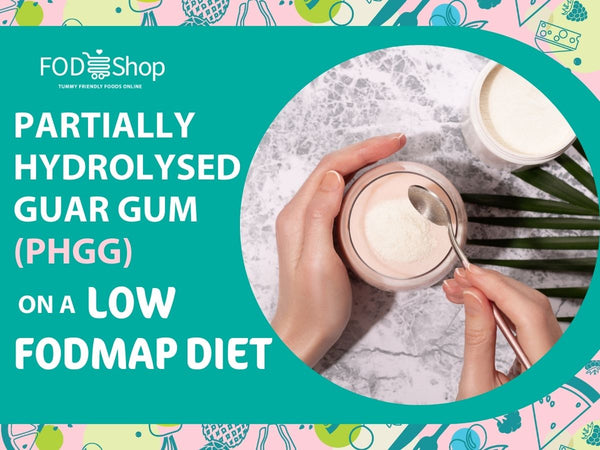- Ph: +61 435 003 412
- operations@fodshopper.com.au
"Organic Orange" has been added to your cart. View cart
"Organic Orange" has been added to your cart. View cart

Dietary fibre is an essential component in our diet to improve bowel regularity, maintain hunger levels, and prevent bowel-related chronic disease. The low FODMAP diet is restrictive, and limits many varieties of vegetables, fruits, and whole grains, which are our main source of dietary fibre.
The Australian Dietary Guidelines currently recommend 25g and 30g of fibre to be consumed per day for female and male adults, respectively. (1) However, normal Australians are not meeting these guidelines, making it even more difficult for someone following a low FODMAP diet to consume adequate amounts of dietary fibre.
Prebiotic fibres are non-digestible ingredients in food that stimulate growth and/or activity of gut bacteria to improve gut health. (2)
Prebiotic fibres are found in many types of soluble fibres, such as galacto-oligosaccharides (GOS), fructo-oligosaccharides (FOS), and resistant starch, which are great for bowel health and frequency, however, not all of these fibres are appropriate for individuals with IBS.
There are a variety of dietary fibre types that can improve or worsen IBS-related symptoms. GOS and FOS, found in foods like onion and garlic, are often the cause of rapid gas production, causing abdominal pain, bloating, and flatulence. (3) On the other hand, soluble dietary fibre, such as resistant starch, guar gums, and pectin, result in lower gas production and minimise IBS symptoms. (3)
Partially Hydrolysed Guar Gum (PHGG) is a soluble dietary fibre derived from the guar bean. It is produced by breaking down the guar gum into smaller particles, making it easier to digest and absorb in the gut. PHGG is commonly used as a food additive and is known for its beneficial effects on gut health.
A low FODMAP diet is often recommended for individuals with irritable bowel syndrome (IBS) or other digestive disorders. FODMAP is an acronym for Fermentable Oligosaccharides, Disaccharides, Monosaccharides, and Polyols. These are simple carbohydrates that can be poorly absorbed in the small intestine, leading to symptoms such as bloating, gas, constipation, diarrhoea, and abdominal pain.
PHGG is low in FODMAPs, making it a suitable dietary fibre option for those following a low FODMAP diet. It provides the necessary fibre intake without triggering digestive symptoms. Additionally, PHGG has prebiotic properties, which means it can promote the growth of beneficial gut bacteria.
1. Improved Digestive Health: PHGG helps to regulate bowel movements and relieve constipation, which is a common symptom in individuals with IBS. It adds bulk to the stool, making it easier to pass through the digestive system. (2)
2. Reduced Bloating and Gas: By following a Low FODMAP diet and incorporating PHGG, individuals may experience a reduction in bloating and gas. (2) PHGG helps to support a healthy balance of gut bacteria, reducing the fermentation of FODMAPs and the associated symptoms.
3. Increased Satiety: PHGG has a high water-holding capacity, which can help promote feelings of fullness and reduce appetite. This can be beneficial for individuals looking to manage their weight or improve portion control.
4. Enhanced Nutrient Absorption: PHGG can improve the absorption of certain nutrients, such as calcium and magnesium, by increasing their solubility in the gut. This can be particularly beneficial for individuals with malabsorption issues or nutrient deficiencies.
PHGG is available in powder form and can be easily incorporated into a Low FODMAP diet. It can be added to smoothies, baked goods, or mixed with water or other beverages. Brands we recommend include Sunfiber, Regular Girl, Wonder Foods PHGG, Happy Belly PHGG, and Superflora.
It is always recommended to consult with a healthcare professional or Accredited Practicing Dietitian before making any significant changes to your diet, especially if you have a medical condition or are taking medication.
1. Australian Dietary Guidelines (2013)
2. Niv E et al. (2016). Randomized clinical study: Partially hydrolyzed guar gum (PHGG) versus placebo in the treatment of patients with irritable bowel syndrome. Nutrition & metabolism, 13, 10. https://doi.org/10.1186/s12986-016-0070-5
3. El-Salhy M et al. (2017). Dietary fiber in irritable bowel syndrome (Review). International journal of molecular medicine, 40(3), 607–613. https://doi.org/10.3892/ijmm.2017.3072

Leave a reply